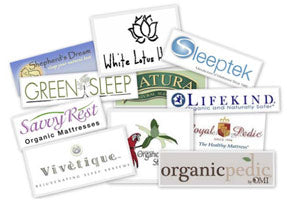How to comparison shop for an organic mattress
I have a question about organic mattresses. 
If you’re shopping around for an organic mattress, use these questions as a guideline when speaking to the salesperson.
Q: If no chemicals or synthetics are used to make my organic mattress, what serves as the fire retardant?
Our organic mattress is wrapped in organic wool, which serves as the fire retardant.
Q: Is the wool soaked in any harmful chemicals, such as boric acid?
No. The wool is scoured and cleaned with an uber-gentle soap called Biokleen. The wool goes through five levels of cleaning and rinsing (you can just imagine how squeaky clean it is at the end of it all!)
Q: Is there any polyester inside of my organic mattress or inside the outer fabric?
No. Polyester is a synthetic polymer made from crude oil, which is essentially purified terephthalic acid (PTA), dimethyl ester dimethyl terephthalate (DMT) and monoethylene glycol MEG). WJ Southard’s motto is, if we cannot pronounce it, we won’t put it in your organic mattress. All of the materials used to make your mattress are organic, natural, and sustainable. Polyester does not fit that build.
Q: Is there any polyurethane foam inside?
No. Like polyester, polyurethane foam is made from chemicals.
Q: Is there any soy based foam inside?
No. While these bio-foams sound healthy, it usually contains 10% soy. The other 90% is traditional polyurethane foam made with synthetic materials... Though it does reduce our reliance on nonrenewable resources, it is not natural.
Q: Is the latex 100% natural?
This is a trick question because there’s no such thing as 100% natural. Latex is only natural in a liquid state. In order to take it from a liquid to a usable and solid state, all latex must be vulcanized. Therefore, a mixture of natural rubber (90-95%), zinc oxide (2-3%), fatty acid soaps (1-2%), sulfur (1-2%), and sodium (1-2%) is created which is essential for the vulcanization, foaming, and curing process. The finished core is then washed a minimum of three times to remove residuals that may be left over after curing. The finished product is approximately 98% natural latex rubber.
Other organic mattress brands (that we would feel comfortable recommending.)
Like our mother always said, “If you don’t have anything nice to say, don’t say anything at all.” So, check them out and decide for yourself.
Manufacturers

Others…(private labels, non-manufacturers, etc.)
Not totally organic, but worth looking into:
- Latex Mattress by Spindle

